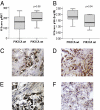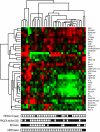PIK3CA mutations associated with gene signature of low mTORC1 signaling and better outcomes in estrogen receptor-positive breast cancer
- PMID: 20479250
- PMCID: PMC2890442
- DOI: 10.1073/pnas.0907011107
PIK3CA mutations associated with gene signature of low mTORC1 signaling and better outcomes in estrogen receptor-positive breast cancer
Abstract
PIK3CA mutations are reported to be present in approximately 25% of breast cancer (BC), particularly the estrogen receptor-positive (ER+) and HER2-overexpressing (HER2+) subtypes, making them one of the most common genetic aberrations in BC. In experimental models, these mutations have been shown to activate AKT and induce oncogenic transformation, and hence these lesions have been hypothesized to render tumors highly sensitive to therapeutic PI3K/mTOR inhibition. By analyzing gene expression and protein data from nearly 1,800 human BCs, we report that a PIK3CA mutation-associated gene signature (PIK3CA-GS) derived from exon 20 (kinase domain) mutations was able to predict PIK3CA mutation status in two independent datasets, strongly suggesting a characteristic set of gene expression-induced changes. However, in ER+/HER2- BC despite pathway activation, PIK3CA mutations were associated with a phenotype of relatively low mTORC1 signaling and a good prognosis with tamoxifen monotherapy. The relationship between clinical outcome and the PIK3CA-GS was also assessed. Although the PIK3CA-GS was not associated with prognosis in ER- and HER2+ BC, it could identify better clinical outcomes in ER+/HER2- disease. In ER+ BC cell lines, PIK3CA mutations were also associated with sensitivity to tamoxifen. These findings could have important implications for the treatment of PIK3CA-mutant BCs and the development of PI3K/mTOR inhibitors.
Conflict of interest statement
Conflict of interest statement: A provisional worldwide patent was filed by Université Libre de Bruxelles for PIK3CA mutation gene signature: prognosis and therapeutic responsiveness of HER2 overexpressing and estrogen receptor–positive breast cancer. S.L., B.H.K., C.S., and G.A.M. are named inventors.
Figures





References
-
- Hennessy BT, Smith DL, Ram PT, Lu Y, Mills GB. Exploiting the PI3K/AKT pathway for cancer drug discovery. Nat Rev Drug Discov. 2005;4:988–1004. - PubMed
-
- Isakoff SJ, et al. Breast cancer-associated PIK3CA mutations are oncogenic in mammary epithelial cells. Cancer Res. 2005;65:10992–11000. - PubMed
-
- Campbell IG, et al. Mutation of the PIK3CA gene in ovarian and breast cancer. Cancer Res. 2004;64:7678–7681. - PubMed
Publication types
MeSH terms
Substances
Grants and funding
LinkOut - more resources
Full Text Sources
Medical
Molecular Biology Databases
Research Materials
Miscellaneous

